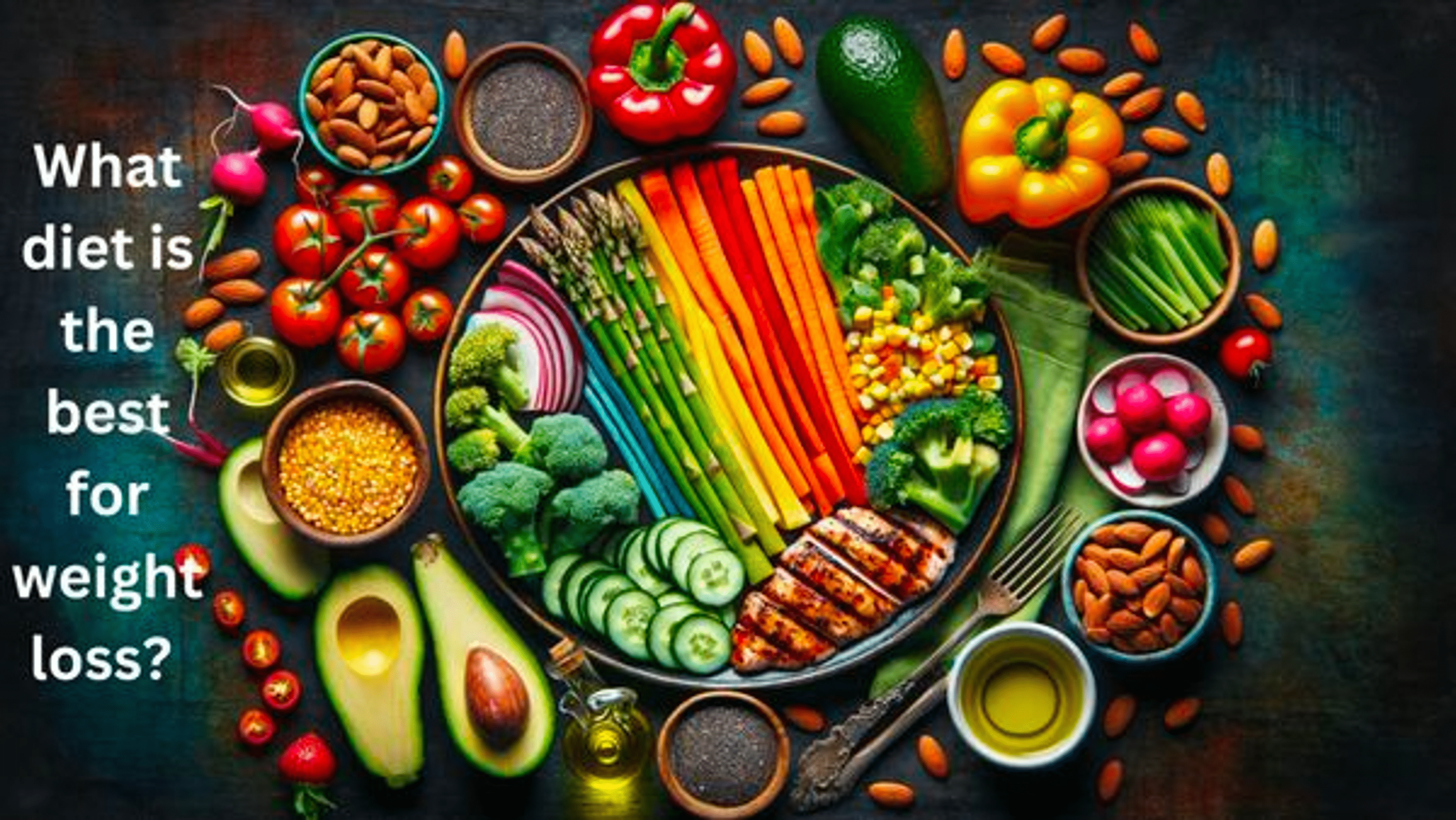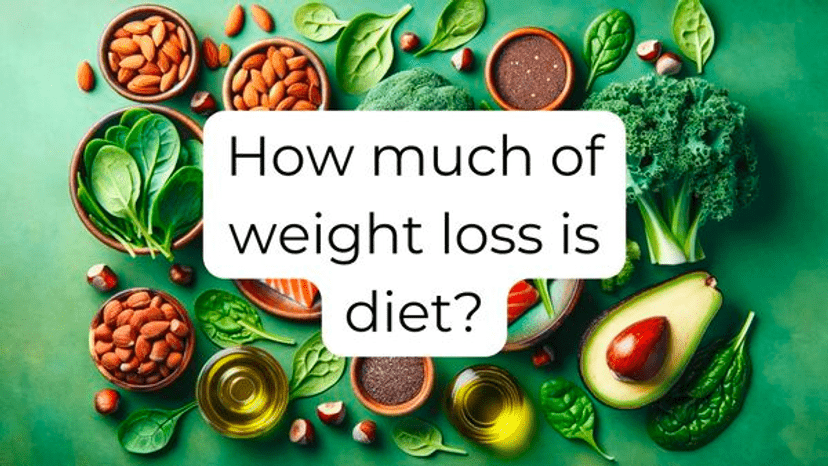What diet is the best for weight loss? Weight loss questions answered

Understanding Weight Loss Basics
When it comes to weight loss, misinformation and confusion are abound. This section aims to disentangle the web and delve into the fundamental concepts of weight loss. We are debunking common myths and providing insights into how different bodies require different diet approaches. Understanding the foundational principles of successful weight loss is crucial as there's no "one-size-fits-all" solution.
There is no "best diet for weight loss"
The first concept that needs to be crystal clear is: there is no universally 'best diet' for weight loss. Each individual is unique with distinct metabolic rates, lifestyles, and dietary preferences, and these factors affect how a person loses weight. Therefore, what works for one person may not work for another. It's about finding a healthy, balanced diet that can comfortably fit into your lifestyle and that you can adhere to long-term.
Principles of effective diets
While there's no 'perfect' diet, there are some general principles that apply to effective weight loss diets. These include:
- Energy deficit: Weight loss occurs when you use more calories than you take in. This creates an energy, or calorie, deficit.
- Nutrient-dense foods: Incorporating plenty of lean proteins, fruits, vegetables, and whole grains can promote extended feelings of fullness to support weight loss.
- Portion control: Monitoring portion sizes can help ensure you are not overeating, even when consuming healthier foods.
- Regular physical activity: Combining diet changes with regular physical activity can help create the needed calorie deficit.
It's important to understand that effective weight loss involves not only a change in eating habits but also a change in lifestyle.
Common diet myths debunked
Many popular diets promise quick, drastic weight loss, but the reality is often very different. These diet myths can be potentially harmful and lead to unhealthy eating habits.
For instance, one common myth is that eliminating all carbs or fats leads to weight loss. In reality, our bodies need carbohydrates and healthy fats for proper functioning. Cutting out an entire food group can lead to nutrient deficiencies, fatigue, and other health problems.
In addition, starvation diets or meal skipping are often touted as quick ways to lose weight. However, these behaviors can lead to muscle loss and slowed metabolism, creating an unhealthy cycle of weight regain and damage to the body's vital systems.
Assessing your dietary needs
The best dietary approach for losing weight is one that meets your nutritional needs, fits your lifestyle and can be maintained for the long term. Speak with a dietitian or healthcare provider for personalized advice based on your health status, food preferences, fitness level and weight-loss goals. Understanding your individual dietary needs is the largest part of the weight loss puzzle and a critical step in creating a sustainable plan for healthy living.
Remember, achieving and maintaining a healthy weight isn't about short-term dietary changes. It's about a lifestyle that includes healthy eating, regular physical activity, and balancing the number of calories you consume with the number of calories your body uses. Sustainable weight loss comes from making healthier choices, understanding portion sizes, and creating a positive relationship with food.
Popular Diets Reviewed
The journey to weight loss is paved with countless diets that promise quick and easy transformations. Yet, the effectiveness of these diets widely ranges and are often contingent upon individual lifestyle conditions and nutritional needs. In this section, we will delve into the core principles, effectiveness, and suitability of several popular diets and provide a comprehensive assessment of each.
Keto Diet Explained
The ketogenic diet, or more commonly known as the keto diet, is a high-fat, very low-carb regime that has been making waves in the weight loss industry for the past decade. The diet operates under the principle of ketosis, - a metabolic state wherein your body, due to the lack of carbohydrates, burns fat for energy instead.
The keto diet is often marked with swift weight loss in its early stages, which can be motivating. Additionally, because of the diet's high-fat content, those following the keto way of eating often report feeling full and satiated after meals.
However, it's critical to note that following a long-term high-fat, low-carb diet could potentially lead to certain health risks, such as vitamin deficiencies, heart disease, and poor gut health due to the lack of fiber. Plus, since the diet regime may be restrictive to some people, its sustainability is often called into question.
Plant-Based Diet for Weight Loss
A plant-based diet, on the other hand, emphasizes whole, plant-derived foods while minimizing or completely avoiding animal products and processed foods. Rich in fiber, this diet can help with digestion and keep you feeling full for longer periods.
Evidence-based studies reveal that a plant-based diet can lead to sustainable weight loss, help enhance heart health, and reduce the risk of certain diseases. It is also deemed as a more sustainable and eco-friendly lifestyle compared to other diets.
However, going plant-based also means that you may need to pay extra attention to ensure you're getting enough protein, vitamin B12, iron, and omega-3 fatty acids.
Mediterranean Diet Benefits
The Mediterranean diet is a balanced and diversified diet that emphasizes heart-healthy fats (such as olive oil), proteins (like poultry and fish), an array of fruits and vegetables, whole grains, and a moderate amount of red wine.
This diet isn't just popular for weight loss, but also for its handful benefits linked to better heart health and longevity. The diet encourages mindful eating and a balanced approach to consuming a wide variety of nutrients, making it a palatable and sustainable long-term choice for many.
Despite the beneficial aspects, the intake of red wine may not be suitable for everyone, particularly for individuals with certain health conditions or those with a history of substance abuse.
To sum up, no single diet can be the perfect fit for everyone. Your ideal diet should cater to your personal needs, align with your lifestyle, and should be sustainable in the long run. It is always recommended to seek professional advice before beginning any diet regime for your weight loss journey.
Creating a Sustainable Weight Loss Plan
When it comes to weight loss, it's not just about the diet or short-term fixes, but more importantly about creating a sustainable lifestyle plan that can help you lose weight and maintain your optimal weight in the long run. This section will delve into three critical steps towards a sustainable weight loss: Setting realistic goals, Incorporating exercise into your routine, and Long-term maintenance strategies.
Setting Realistic Goals
The first step in creating a sustainable weight loss plan is setting realistic and achievable goals. Often, people's weight loss aspirations are driven by unrealistic expectations, which can lead not only to disappointment but can promote unhealthy behaviors.
Here's how you can set practical goals:
-
Be patient and reasonable with yourself. Keep in mind that healthy weight loss is a gradual process. Aiming for losing 1 to 2 pounds per week is a practical and sustainable target.
-
Consider your lifestyle and resources. Set goals that fit with your lifestyle. If you have a busy schedule, short and intensive workouts might be better for you.
-
Celebrate small achievements. Weight loss is a journey. Celebrating small achievements can keep you motivated.
Incorporating Exercise into Your Routine
Incorporating exercise in your daily routine is key in sustainable weight loss. The physical activity doesn't only burn calories but helps in making your body fitter and healthier. Here's some advice to consider:
-
Choose activities you enjoy. Don't force yourself into an exercise routine that you don't find engaging or fun. The more you enjoy the activity, the more likely you will stick to it.
-
Start slow and gradually increase intensity. Remember, you are not training for a marathon. If you have never exercised regularly before, start with a light and enjoyable activity like walking or cycling.
-
Incorporate strength training. Weight trainin
g can help you build muscle, which has a higher metabolic rate, meaning it burns more calories, even at rest.
Long-Term Maintenance Strategies
Once you’ve reached your weight loss goal, maintaining that weight loss becomes the next challenge. Consider these strategies for long-term success:
-
Make permanent changes. The dietary and lifestyle changes you've adopted should be sustained for life, not just until you reach your weight goal.
-
Stay consistent with your exercise plan. Do not stop training once you hit your goal weight. Make it a part of your lifestyle.
-
Have a support system. Having a network of friends, family, or a fitness community can help maintain motivation and hold you accountable for your lifestyle choices.
Remember, the journey to sustainable weight loss is a marathon, not a sprint. It might take time, but the results are definitely worth the effort and patience. Keep these points in mind, and you will surely be successful in your long-term weight loss journey.
In Summary
The journey to sustainable weight loss is multifactorial and highly individualized, there is no universally 'best diet' for weight loss. Every individual needs to tailor their dietary approach based on their unique metabolic rates, lifestyles, and dietary preferences. In practice, creating a sustainable weight loss plan involves:
setting realistic goals, incorporating exercise into your routine, and implementing long-term maintenance strategies.Successful weight loss and maintenance is a marathon rather than a sprint, it requires patience, perseverance, and resilience. The takeaway point is that losing weight and staying fit is a lifelong commitment, not a momentary goal. Thus, promoting a healthy relationship with food and cultivating a physically active lifestyle is the cornerstone of ongoing health and wellness.
Your plan of action should include:
- Assessment: Understand your dietary needs and preferences. Research on different dietary approaches and the principles behind them.
- Planning: Set realistic and achievable goals. Integrate a balanced, nutrient-dense diet and regular exercise into your lifestyle.
- Implementation: Implement the planned diet and exercise routine. Keep track of your progress. Celebrate small wins to keep yourself motivated.
- Evaluation and Adjustment:
Regularly evaluate your progress towards your goals. If something isn’t working well for you, adjust your plan accordingly.
The outlined action steps for successful weight loss might include the following:
- Consult with a healthcare provider or a dietitian to understand your individual dietary needs and set a balanced diet plan.
- Set short-term and long-term weight loss goals that are realistic and achievable.
- Gradually incorporate physical activity into your daily routine. Choose activities you enjoy to make the exercise seem less of a chore.
- Practice portion control. Integrating nutrient-dense foods into your diet can help you feel full and support weight control.
- Regularly monitor your weight and adjust your diet plan and exercise regime as necessary.
- Seek a support system. Share your weight loss journey with friends or join a fitness community for encouragement and accountability.
- Assert consistency and practice mindful eating. Understand that maintaining weight loss is as crucial as losing weight.
Remember, sustainable weight loss is not about deprivation or drastic changes; it's about modification and moderation. It might not bring overnight results, but it will ensure you stay healthy and fit in the long run.




![How to set New Year's Resolutions [Explained]](https://img.imageboss.me/onestep/width/828/format:auto,quality:80/assets/site/blog/how-to-set-new-years-resolutions-explained.png)






